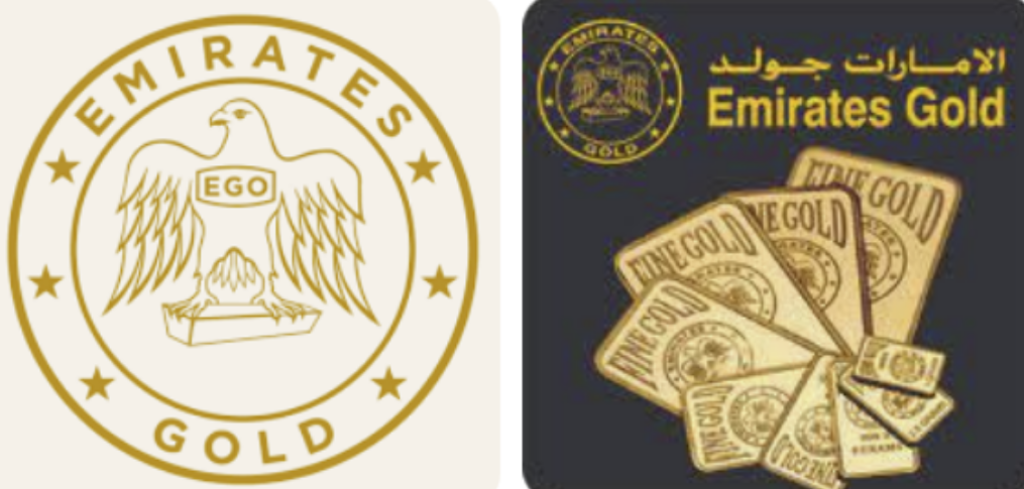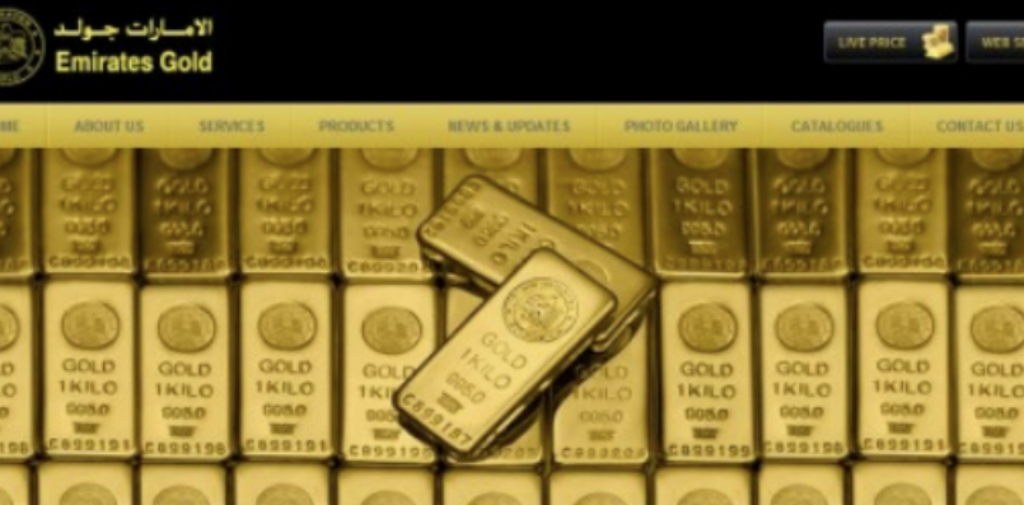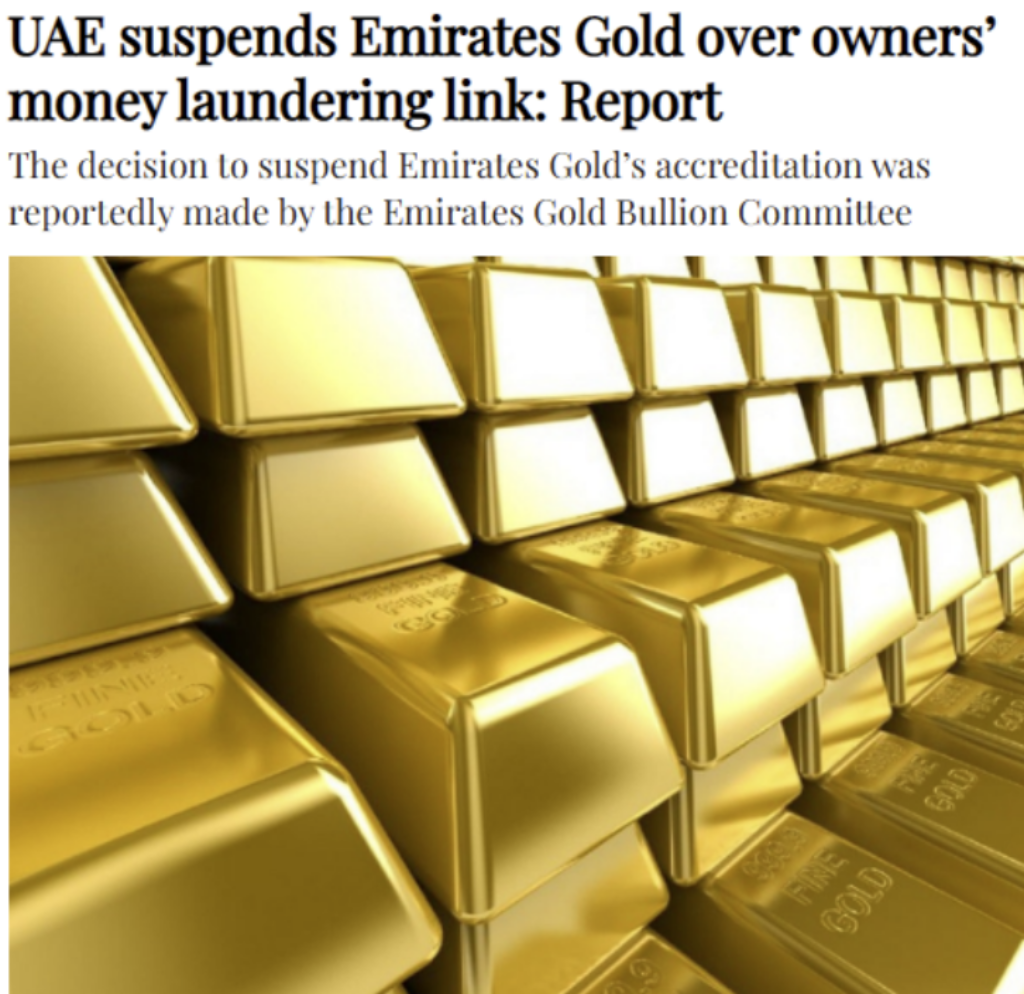
What is the reason behind the UAE’s suspension of Emirates Gold DMCC? Let’s move on and see how much more I can tell you before we dive into thorough research to learn this.
Due to their wide selection of bullion bars in various sizes and relatively modest premiums, Emirates Gold DMCC claims to be one of the most well-known UAE gold manufacturers outside of the Emirates. They also assert to make elegant semi-numismatic bars for collectors across the world, along with coins, medals, and pendants for the Middle Eastern market, in addition to their well-liked investment bars.
Emirates Gold DMCC: Excluded from the UAE and UK bullion markets

Emirates Gold DMCC, a significant gold refinery in the United Arab Emirates (UAE), has been forbidden from supplying gold to Dubai’s bullion market. It was decided to take this measure because the UAE is coming under more and more scrutiny as a possible center for illegal activity and money laundering.
The suspension is the result of the business’s failure to obtain clearance by the essential anti-money laundering and accountable sourcing requirements to be included on the UAE Good Delivery list of authorized refineries.
Since it began manufacturing and refining gold more than 30 years ago, Emirates Gold DMCC has played a vital role in the commercial hub of the Gulf. The UAEGD (UAE Gold & Jewellery Group), which manages the UAE Good Delivery list, accords gold refineries with the authority to transport gold into the country’s gold market, making it a significant certification.
However, to keep their names on the list, refiners are required to follow strict anti-money laundering and sourcing guidelines to protect the integrity of the gold trade.
What do you know about Money Laundering?
Criminals are largely driven by the potential financial gain from unlawful activity, yet they have difficulty using this money covertly. Their method of making illicit riches appear legal is money laundering. It’s a significant instrument for many illicit operations, including cocaine trafficking and terrorism, assisting criminals in growing and upholding a façade of legitimacy.
The membership of Emirates Gold DMCC was suspended by the London Bullion Market Association (LBMA), which is in charge of overseeing the biggest gold trading center on the planet.
The LBMA’s decision was based on the findings of an earlier inquiry evaluation, which most likely highlighted problems with the adherence of Emirates Gold DMCC to industry standards.
Emirates Gold DMCC has been barred from trading in two of the biggest gold markets in the world, underscoring the mounting pressure on the UAE to confront its role in supporting money laundering and other criminal activities.
Due to concerns that it acts as a pathway for Russian gold, which has been subject to sanctions from the EU, Switzerland, and the US, to reach the market, attention on Dubai’s role in gold smuggling has been even more intense.
Some Swiss trading companies have set up subsidiaries in the UAE in reaction to the restrictions on Russian gold, allowing them to carry on trading Russian goods according to the law.
According to a statement made by the UAE federal government, which assumed control of the gold trade in 2021, a final decision on whether to remove the accreditation of Emirates Gold DMCC would be made after the year after an assessment of the current circumstances.
Following the death of the founder of Emirates Gold DMCC in 2022, the ownership of Emirates Gold DMCC changed, which led gold market agencies to perform due diligence.
The suspension followed an investigative displayed by Al-Jazeera on gold trafficking from Zimbabwe that involved some of Zimbabwe’s leading figures and was purportedly directed through the UAE.
Due to the high price of gold, its simplicity in being broken down and cast to disguise its origin, and its popularity as a different method of payment beyond the US dollar banking system, this occurrence has increased concerns about the susceptibility of the gold business to money laundering.
Due to its inclusion on the Financial Action Task Force’s “grey list” for financial crimes in the preceding year, the UAE’s standing in the international financial world has weakened.
In regards to the suspension, Emirates Gold DMCC, a department of the Dubai government, has refrained from saying something.
Emirates Gold DMCC: Money-laundering Allegations

The United Arab Emirates (UAE) took serious action against Emirates Gold DMCC, a key gold refinery in the nation, in July 2023 because of possible connections to money laundering. The license of Emirates Gold DMCC was stopped due to its inclusion on the Good Delivery List of reputable refineries in the UAE.
The Ministry of Economy-led Bullion Committee, which discovered possible connections between the refinery’s owners and others suspected of engaging in money-laundering activities, expressed concerns that led to this suspension.
One important development that has been made public is the identification of the owner of Emirates Gold DMCC.
Two of the refinery’s owners of Emirates Gold DMCC were related to Zimbabwean industrialists Simon Rudland and Howard Baker, according to reporter’s sources familiar with the UAE’s choice.

The charges of potential money laundering relationships were strengthened by these connections, which prompted concerns.
The LBMA’s suspension of its affiliate membership, the license suspension of Emirates Gold DMCC, and its ensuing removal from the Good Delivery List all convey a clear statement about how seriously the UAE is taking any potential financial malfeasance.
These efforts show the UAE’s dedication to following international standards and laws about anti-money laundering and countering the funding of terrorism, as well as the nation’s readiness to take strong action to safeguard the reliability of its financial system.
In general, the UAE’s proceedings against Emirates Gold DMCC serve as a reminder of the value of strict financial regulation and compliance with anti-money laundering and counter-terrorism funding laws in the context of the global economy.
Cooperation between nations and organizations in the fight against financial crime can help to protect the credibility of the financial system and preserve confidence among global stakeholders.
What is Money Laundering?
Money laundering is the practice of hiding funds gained illegally so they appear genuine. It can have a significant impact on the stability of financial institutions and economies.
While posing serious risks to both national and international security, terrorism funding entails giving money to people or organizations engaged in terrorist actions.
International organizations and regulatory bodies keep a close eye on money laundering and terrorist financing, and nations are expected to follow rigorous rules and take appropriate action against firms or people implicated in these activities.
A Money Laundering Route: The UAE’s Gold Industry

A channel for money laundering is the UAE Gold Industry, which is associated with Emirates Gold DMCC. You don’t think it’s true? Okay, please read what I have to say; you will see that I am correct.
In fact, the United Arab Emirates (UAE) has emerged as a significant force in the world’s gold market, particularly in the Emirate of Dubai, which has acquired the moniker “the city of gold” for good causes.
Dubai has made a name for itself as one of the world’s major centers for the trading of gold during the past few decades. The UAE’s quick expansion as a prominent gold market has been facilitated by its advantageous position, well-developed infrastructure, and welcoming corporate environment.
Money laundering issues have grown along with the development of the gold sector in the United Arab Emirates. Because of its high value, ease of transportation, and capacity to be melted down and recast, making it difficult to determine the origin of the gold, the gold trade has long been regarded as a vulnerable way for illegal monies to enter the financial system.
In an effort to reduce these dangers, regulatory bodies have increased openness in the gold business and taken steps to stop money laundering. To guarantee that gold refineries and traders adhere to international legislation, they have put in place anti-money laundering policies and responsible sourcing guidelines.
Strict due diligence evaluations are required for inclusion on the UAE’s Good Delivery List and membership in organizations like the London Bullion Market Association (LBMA) to preserve the integrity of the gold trade.
Why is the UAE such a desirable location for the laundering of illicit funds and gold?
The UAE’s reputation as a haven for gold smuggling can be due to several important elements, most notably its lenient customs regulations, particularly about hand-carried gold.
The UAE, in contrast to many other nations with tougher controls, has let traders import gold without having to show proof of its origin or payment paperwork. This permissive policy has made it simpler for illegal gold to enter the nation unnoticed, opening up chances for money launderers to take advantage of the system.
The inadequate due diligence practices used by gold souk merchants are a crucial element increasing the UAE’s susceptibility to money laundering and the smuggling of gold. In the UAE, the gold trade is heavily influenced by the gold souks or traditional markets.
The origin of the gold that merchants in these markets buy and sell, however, is not required to be verified. This disregard for the place of origin or working conditions of the gold makes it possible for illegally obtained or smuggled gold to enter the legal market unchecked.
The UAE is susceptible to large-scale money laundering, according to research by the Financial Action Task Force (FATF) that was released in 2020. One of them is the UAE economy’s heavy reliance on cash, which makes it difficult to efficiently trace financial transactions.
These issues are made worse by the widespread use of the black market for gold, which gives criminals a way to make money illegally through dishonesty and fraud. Furthermore, the UAE’s sizeable foreign population complicates anti-money laundering operations by producing a wide range of financial activities that need to be observed.
For money launderers, the illegal gold that enters the UAE can be used for a variety of things. In addition to being used to launder these illicit gains, it can also be used to produce criminal income through a variety of illegal activities.
To lessen the risks connected with the illegal gold trade and money laundering activities, stricter controls must be put in place. These controls must include requiring proof of the origin and credibility of gold transactions, conducting regular audits, and encouraging greater transparency in the gold trade.
To build a strong and resilient system against these risks, close cooperation between regulatory agencies, law enforcement organizations, and industry stakeholders is essential.
Cases of Money Laundering in the UAE’s Gold Industry
A rise in money laundering threats brought on by the UAE’s gold industry’s expansion. The UAE has grown to be a significant participant in the global gold market, and as a result, the criminal underworld has become interested in the UAE’s gold business to take advantage of the weak regulatory environment and inadequate due diligence procedures.
To emphasize the risks of money laundering, two significant, well-known examples involving the gold industry are discussed. In the first instance, a team of gold smugglers is accused of using the Dubai Gold and Commodities Exchange (DGCX) to hide proceeds from unauthorized gold sales.
The plan involves smuggling gold into Dubai, selling it on the DGCX, then using the money to buy legal gold to sell on the world market while masking the use of illegal monies.
In the second instance, Kaloti Jewellery Group, a gold refiner with a location in Dubai, was charged with participating in a long-running operation to launder money.
The business was charged with obtaining substantial amounts of gold from illegal mines in South America and Africa, smuggling it into Dubai, refining it, and then reselling the gold on the world market to launder the money earned from the sales of the illegally mined gold.
According to my research the regulatory gaps and lax due diligence procedures in the UAE’s gold business, have left it open to money laundering schemes. A situation where unlawful gold transactions can happen without proper control has been made possible by insufficient documentation requirements and a lack of independent audits.
As a result of its lax regulatory environment and insufficient due diligence procedures, the UAE’s gold business has become a money laundering hotspot while being a key economic contributor.
The aforementioned instances highlight the critical need for financial institutions, governments, and other stakeholders to work together and put strong rules and compliance mechanisms into place to protect the gold business from being used for illegal purposes. To reduce money laundering concerns and safeguard the integrity of the financial system, it is necessary to work together to transform the gold business into a viable and ethical sector.
Conclusion
In conclusion, the UAE’s suspension of Emirates Gold DMCC from the bullion market was due to its failure to obtain clearance by essential anti-money laundering and responsible sourcing requirements.
The company’s alleged connections to individuals involved in money-laundering activities and its inclusion in the “grey list” for financial crimes further heightened concerns about its operations.
The UAE’s gold industry, including Emirates Gold DMCC, has been under scrutiny for potential vulnerabilities to money laundering due to lax regulatory practices and inadequate due diligence procedures.
To combat money laundering, international cooperation, stricter controls, and greater transparency in the gold trade are necessary.










It was very important to put stricter controls and mitigate risks, regulatory agencies have strengthened transparency in the gold industry and taken actions to prevent money laundering. To ensure that gold refineries and traders follow international law, they have implemented anti-money laundering rules and responsible sourcing criteria. This is a strong action taken against the money launderers.
This is excellent that action has been taken. Money laundering is a serious crime and needs to be addressed. Many terrorists or criminals can take advantage of the lax regulatory environment of the UAE.
UAE’s lenient customs regulations are the reason why it became so easy for gold smuggling. This policy is the reason why illegal gold entered the nation unnoticed. Which helped the money launderers to take advantage of the system and do what they wanted. It was very important to put a regulation and sanction otherwise it would have caused a lot of problems.
This is ridiculous that till now nothing was done about this big issue. These money launderers were doing illegal activities so easily. Now these people will understand what can be the consequences of doing illegal things.
It’s good that such crucial action has been taken against money laundering in UAE. So many terrorists and criminals must have taken so much advantage of lax regulation but now after this company is now in the grey list it will stop any more money laundering.
What I don’t understand is why were these actions not taken before. It would have made a much better impact in controlling all these illegal activities. I am not able to understand why they waited so long to put stricter controls.
It’s good that there has been action taken against Emirates Gold DMCC. It is essential to stop such cases of money laundering. It is a crime. They should get very strict punishment.
This company being on the ‘grey list’ is the biggest proof of their illegal activities. Stricter controls needed to be put on this company. International cooperation and strict controls can only stop money laundering.